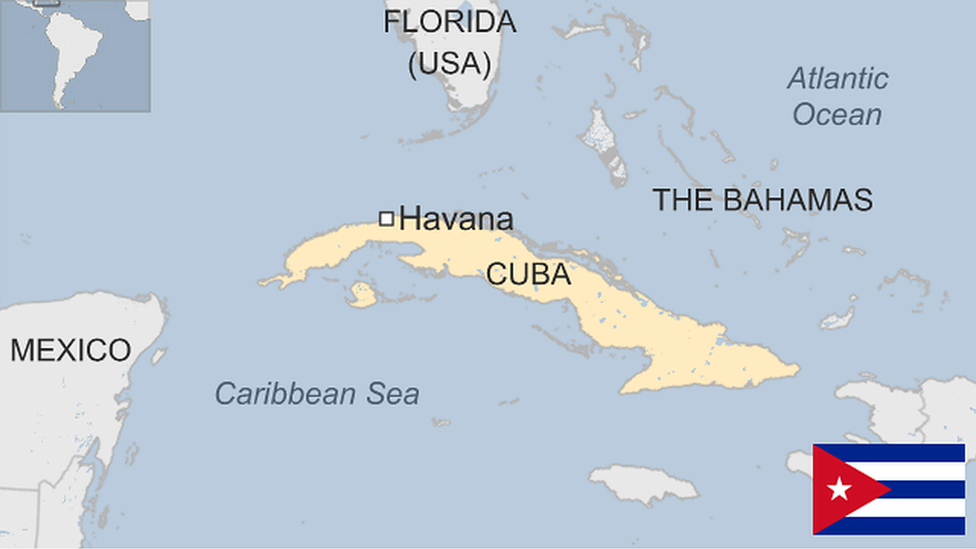Miguel Diaz-Canel: The man tipped to lead Cuba
- Published
Who might take over from the Castro brothers?
The main road into Santa Clara passes larger-than-life images of the brothers who have dominated Cuba for over five decades.
Fidel and Raul Castro smile and wave from a billboard.
But ill health forced Fidel, now 86, to step back from front-line politics. And Raul, who is 81, has recently also confirmed that this will be his last term as president.
And it seems the brothers have decided who could succeed them.
Miguel Diaz-Canel began his political career as a member of the Young Communist League in the city of Santa Clara.
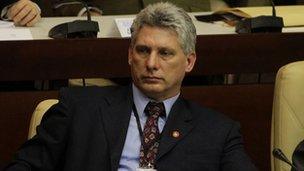
Mr Diaz-Canel has risen through the ranks of the Communist Party hierarchy
In February, he was promoted to the post of first vice-president of the Council of State. He is now President Raul Castro's number two - a strong sign he is being groomed for the presidency.
Despite a flurry of foreign trips over recent months, Mr Diaz-Canel, 52, is little-known abroad. And until recently he had a relatively low profile even within Cuba.
But Raul Castro insists his new deputy is no "upstart", outlining his gradual rise through the Communist Party ranks.
Ten years ago, Mr Diaz-Canel's "ideological firmness" got him a seat on the Politburo, the party's executive committee.
His latest promotion is part of what Mr Castro called the "gradual and orderly transfer" of key roles to a younger generation, as the ageing revolutionaries try to preserve the communist system for the future.
Local boy
Clues to Mr Diaz-Canel's character are best found in his hometown of Santa Clara.
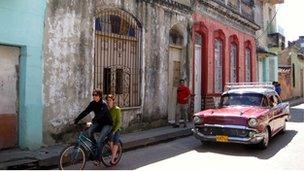
Mr Diaz-Canel's family has a modest home (middle, unpainted) in Santa Clara
"He worked all hours and would go round seeing for himself how things were going, checking up," recalls neighbour Ela Perez Montpellier.
Ms Perez says Mr Diaz-Canel, who was appointed leader of the Communist Party for Villa Clara province at the age of 33, was a modest man during his decade in charge.
"He had an official car, but didn't use it for personal things. He walked or took his bike," she says.
"He was honest. That's why so many people here like him."
From the street, the family home certainly looks humble, its exterior unpainted. His sister-in-law only says that the family is "very proud" about his promotion.
"People wept when he left Santa Clara!", recalls Alberto Scinasis, who describes the rising Communist Party star as "intelligent, studious and hard-working".
"He knows how to lead," he adds. "It's how he got where he is."
Economic change
Mr Diaz-Canel may well have been inspired by his surroundings: Santa Clara is the site of the last battle in the Cuban Revolution.
In 1958, Che Guevara and fellow revolutionary Camilo Cienfuegos captured the city. Less than 12 hours later, then-president Fulgencio Batista fled the country.
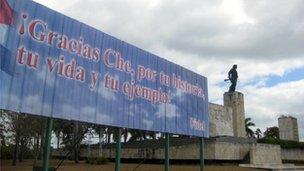
Santa Clara's close links with Che Guevara may have contributed to Mr Diaz-Canel's revolutionary fervour
But like most Cubans today, Miguel Diaz-Canel was born after the revolution.
No one doubts his ideological commitment. But Cuba's socialist model is changing, forced since the 1990s to open up to limited private enterprise to survive the loss of huge Soviet subsidies.
Mr Diaz-Canel has been implementing those changes from the start. His career took off during the first wave of Cuban economic liberalisation.
"Things were very bad then, there was nothing to sell in any of the cafes, but Mr Diaz-Canel got them working again," Santa Clara resident Antonio Valdes recalls.
As provincial party secretary "he was running a budget… and experimenting with the decentralisation that will now go nationwide," says Julia Sweig, Cuba expert at the US Council on Foreign Relations.
Mr Diaz-Canel has signalled that he favours more complex reforms as the country attempts to increase productivity, reduce imports and eventually abolish its much-resented dual currency.
Raul Castro insists those changes will occur gradually, resisting what he called this month "the pressure of those who insist we should move faster."
There is no sign as yet that Mr Diaz-Canel is among them. Nor is it clear if he might become a Cuban version of former Soviet leader Mikhail Gorbachev, as some have speculated, bringing about the kind of deeper social and political change which could herald an end to communist rule.
Balancing act
Whoever takes over from Raul Castro will inherit a difficult balancing act.
Flower stall owner Lourdes Ayaldo thinks Mr Diaz-Canel can master that act. She believes capitalism is "egotistical" and that the socialist system should not be eliminated because "it's humane".
"We need to combine the good from each of them, socialism and capitalism," Lourdes says. "I think Diaz-Canel's the right person to do that."
Ramon Silverio, who owns Cuba's most famous gay club, El Mejunje, also has good things to say about Mr Diaz-Canel.
He says his club would not have survived had it not been for Mr Diaz-Canel's backing. The club welcomed rockers and "anyone different", at a time when communist Cuba did not, he says.
"I think this place is an example of his broad mind and forward-thinking. He defended it against protests," Mr Silverio explains, as an elderly couple dance between graffiti-scrawled walls in the background.
Whether that tolerance extends to dissenting political views, currently banned here, is unclear.
Other Communist Party high-flyers have shown promise as potential successors to the Castro brothers before, only to crash and burn.
But with Cuba's original revolutionaries in their 80s, time is on Miguel Diaz-Canel's side.
His focus now will surely be to prove they would be placing their project in safe hands.
- Published25 February 2013
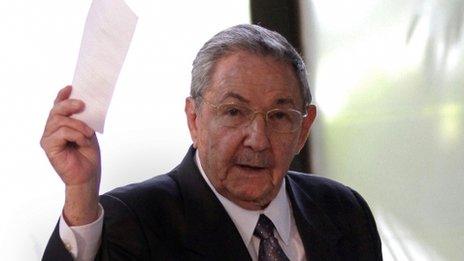
- Published23 February 2013
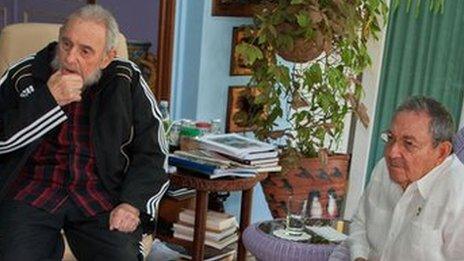
- Published25 February 2013
- Published29 August 2023
